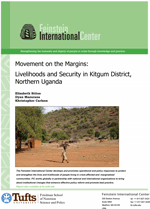The protracted conflict in northern Uganda has created profound insecurity, brought the widespread loss of agrarian livelihoods, and pushed nearly two million people into internal displacement camps. With the current cessation of hostilities between the rebel Lord’s Resistance Army and the government of Uganda, many people are increasingly on the move in northern Uganda, whether moving in and out of camps on a daily or seasonal basis, moving between camps and semi-settled villages, or returning to their pre-war homes.
Central questions: How do households maintain themselves under these conditions? How do they adapt their livelihood strategies to ensure the household members survive? What mechanisms do individuals, households and communities employ in an effort to ensure physical safety?
The report uses field data collected during research with conflict-affected households in Kitgum district to examine these and other questions.
Key findings:
- How movement, social networks, gender and age influence and shape household strategies to ensure survival and to improve levels of human security.
- Why people stay in camps, leave camps, re-enter villages or re-establish villages.
- How different categories of people have developed livelihood and protective strategies to meet their needs and the needs of their households, identified though a careful gender and generational analysis.
- Where protective strategies are working and why, where they fail and why, and who is at heightened risk when these strategies fail.
The report ends with a forward-looking conclusion that underscores the study’s main findings and reflects on how these findings can be applied to on-going and future work in northern Uganda.
Other Related Projects:







